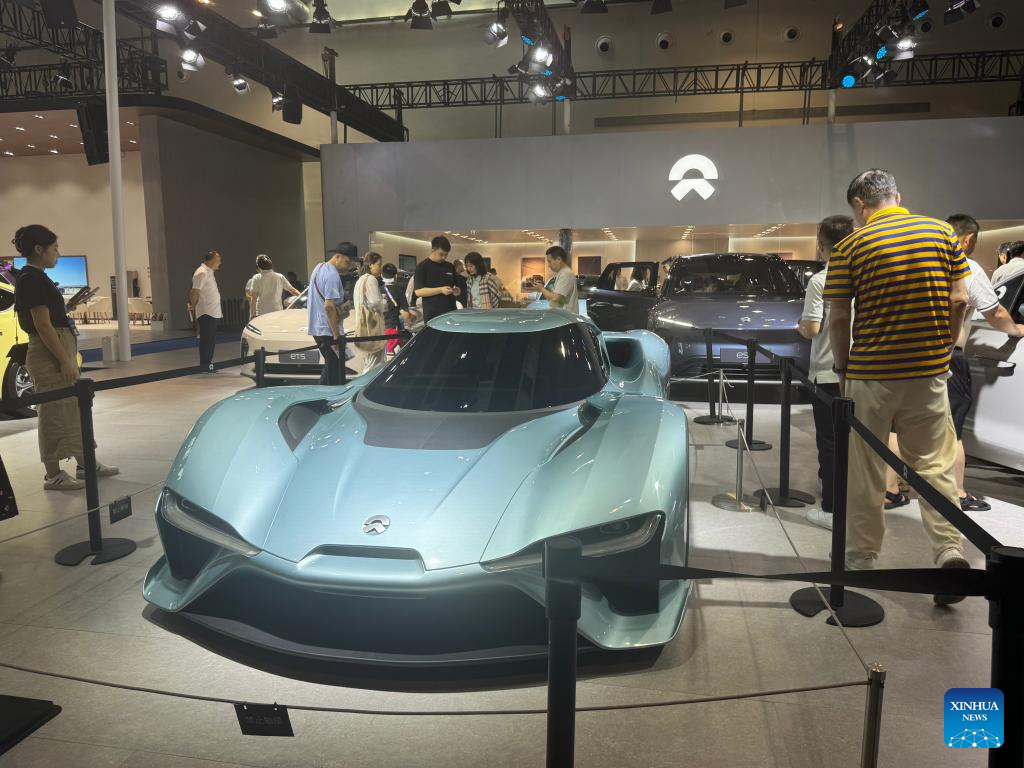
 0 Comment(s)
0 Comment(s) Print
Print E-mail Xinhua, July 25, 2024
E-mail Xinhua, July 25, 2024

Vehicles of a Chinese automaker are displayed during the 21st Changchun International Auto Expo in Changchun, northeast China's Jilin Province, July 18, 2024. [Photo/Xinhua]
At the just-concluded 21st Changchun International Auto Expo, major Chinese auto companies commanded the attention of large crowds with their cutting-edge in-vehicle technologies.
Brands like Huawei, NIO, Li Auto and XPENG showcased navigation and temperature adjustment features, attracting streams of consumers eager to experience the latest innovations in automotive technology.
The 10-day event, which concluded on Monday, featured new energy and intelligent connected vehicle products and technologies, attracting 124 auto brands and showcasing 1,100 vehicles, including 307 new energy models.
"The test drive experience was impressive, and I'm considering buying one," Li Mingyan, an exhibitor for Changchun Faway Automobile Components Co., Ltd., said after test-driving Huawei's AITO S9 during the expo.
"The car's central control screen and LCD instrument panel are my favorite features, and the rear armrest touch screen and projector enhance practicality," Li said.
Models equipped with advanced in-vehicle interaction technologies dominated the expo, with many consumers expressing strong purchasing intent. Visitors commenting on the products made various observations, such as noting the increased accuracy of 360-degree voice recognition, and that large screens for rear seats are ideal for family trips.
In recent years, the Chinese auto industry has accelerated its transition toward intelligence and connectivity. Domestic car companies are focusing on the deep development of in-vehicle systems, positioning advanced in-vehicle interaction technology as a key development area, along with autonomous driving.
They have launched new models featuring cutting-edge in-vehicle systems to enhance their brand image and market share. "Increasingly diverse rear monitors and the applications supported by in-vehicle systems not only control driving functions but also offer emotional interaction capabilities, making them more informative and user-friendly," said Zhu Xiaolong, a senior artificial intelligence engineer from Shanghai.
Feedback from recent auto shows has indicated consumers are willing to pay for overall interaction upgrades, rather than just an upgraded driving experience. At the 2024 Beijing International Automotive Exhibition in late April, a cockpit-driving integration platform launched by Autolink, Hozon Auto and Qualcomm garnered significant attention, featuring immersive graphics, gaming displays and ultra-high-definition infotainment.
At the 28th Guangdong-Hong Kong-Macao Greater Bay Area International Auto Show in June, the BYD Qin series also stood out, with models equipped with 15.6-inch rotating floating pads and mobile NFC car keys.
According to the China Association of Automobile Manufacturers, car sales in the first half of the year reached nearly 14.05 million units, up 6.1 percent year on year.
"Twenty cities have launched car-road-cloud integration pilot projects, nine companies are conducting smart connected vehicle production access and road trials, and the sales share of cars with combined auxiliary driving functions now exceeds 50 percent," Xin Guobin, vice minister of industry and information technology, said at the 2024 China Auto Forum in July.
Industry insiders say that though domestic car companies still face challenges in vehicle operating systems and industrial design software, continuous advancements in intelligent technology will make in-vehicle interaction systems the standard in vehicles of the future.
"Smart connected vehicles are entering a new stage of comprehensive iterative development, becoming the main driving force for new quality productive forces in the automotive industry," Yang Zhongping, deputy secretary-general of the China Association of Automobile Manufacturers, said at the 2024 China Commercial Vehicle Forum.